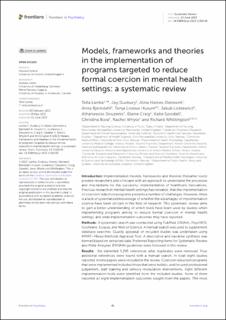| dc.contributor.author | Lantta, Tella | |
| dc.contributor.author | Duxbury, Joy | |
| dc.contributor.author | Haines-Delmont, Alina | |
| dc.contributor.author | Björkdahl, Anna | |
| dc.contributor.author | Husum, Tonje Lossius | |
| dc.contributor.author | Lickiewicz, Jakub | |
| dc.contributor.author | Douzenis, Athanassios | |
| dc.contributor.author | Craig, Elaine | |
| dc.contributor.author | Goodall, Katie | |
| dc.contributor.author | Bora, Christina | |
| dc.contributor.author | Whyte, Rachel | |
| dc.contributor.author | Whittington, Richard Charles | |
| dc.date.accessioned | 2023-11-16T06:55:05Z | |
| dc.date.available | 2023-11-16T06:55:05Z | |
| dc.date.created | 2023-08-23T15:12:30Z | |
| dc.date.issued | 2023 | |
| dc.identifier.citation | Frontiers in Psychiatry. 2023, 14 . | en_US |
| dc.identifier.issn | 1664-0640 | |
| dc.identifier.uri | https://hdl.handle.net/11250/3102861 | |
| dc.description.abstract | Introduction: Implementation models, frameworks and theories (hereafter tools)
provide researchers and clinicians with an approach to understand the processes
and mechanisms for the successful implementation of healthcare innovations.
Previous research in mental health settings has revealed, that the implementation
of coercion reduction programs presents a number of challenges. However, there
is a lack of systematized knowledge of whether the advantages of implementation
science have been utilized in this field of research. This systematic review aims
to gain a better understanding of which tools have been used by studies when
implementing programs aiming to reduce formal coercion in mental health
settings, and what implementation outcomes they have reported.
Methods: A systematic search was conducted using PubMed, CINAHL, PsycINFO,
Cochrane, Scopus, and Web of Science. A manual search was used to supplement
database searches. Quality appraisal of included studies was undertaken using
MMAT—Mixed Methods Appraisal Tool. A descriptive and narrative synthesis was
formed based on extracted data. Preferred Reporting Items for Systematic Review
and Meta-Analyses (PRISMA) guidelines were followed in this review.
Results: We identified 5,295 references after duplicates were removed. Four
additional references were found with a manual search. In total eight studies
reported in nine papers were included in the review. Coercion reduction programs
that were implemented included those that were holistic, and/or used professional
judgement, staff training and sensory modulation interventions. Eight different
implementation tools were identified from the included studies. None of them
reported all eight implementation outcomes sought from the papers. The most requently reported outcomes were acceptability (4/8 studies) and adaptation
(3/8). With regards to implementation costs, no data were provided by any of the
studies. The quality of the studies was assessed to be overall quite low.
Discussion: Systematic implementation tools are seldom used when efforts are
being made to embed interventions to reduce coercive measures in routine mental
health care. More high-quality studies are needed in the research area that also
involves perspectives of service users and carers. In addition, based on our review,
it is unclear what the costs and resources are needed to implement complex
interventions with the guidance of an implementation tool. | en_US |
| dc.language.iso | eng | en_US |
| dc.rights | Navngivelse 4.0 Internasjonal | * |
| dc.rights.uri | http://creativecommons.org/licenses/by/4.0/deed.no | * |
| dc.title | Models, frameworks and theories in the implementation of programs targeted to reduce formal coercion in mental health settings: a systematic review | en_US |
| dc.type | Peer reviewed | en_US |
| dc.type | Journal article | en_US |
| dc.description.version | publishedVersion | en_US |
| cristin.ispublished | true | |
| cristin.fulltext | original | |
| cristin.qualitycode | 1 | |
| dc.identifier.doi | 10.3389/fpsyt.2023.1158145 | |
| dc.identifier.cristin | 2169113 | |
| dc.source.journal | Frontiers in Psychiatry | en_US |
| dc.source.volume | 14 | en_US |
| dc.source.pagenumber | 0 | en_US |

